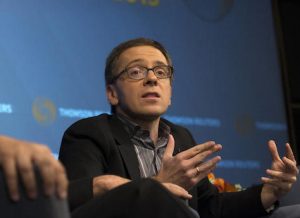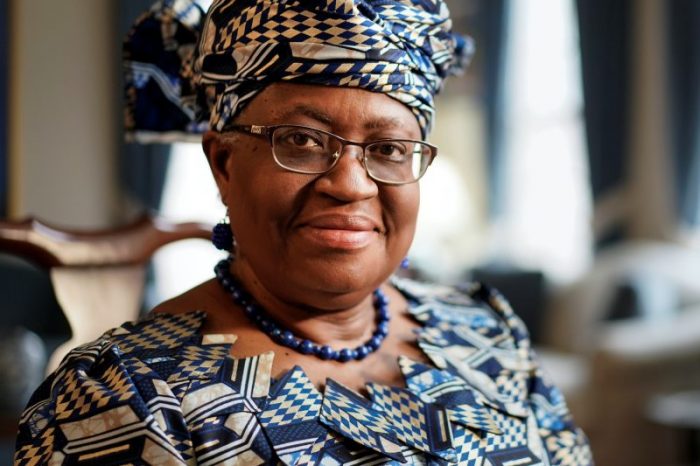Tit-for-tat trade wars would have catastrophic consequences for global growth, the head of the World Trade Organization warned on Thursday.
“If we have tit-for-tat retaliation, whether it’s 25% tariff (or) 60% and we go to where we were in the 1930s we’re going to see double-digit global GDP losses. That’s catastrophic. Everyone will pay,” WTO director-general Ngozi Okonjo-Iweala said at the World Economic Forum in Davos.
The Nigerian WTO boss made her remarks in a debate on US President Donald Trump’s threats to impose tariffs on nations he regards as unfairly reaping trade advantages from America.
ALSO SEE: Bytedance ‘Plans $20 Billion Outlay on AI Infrastructure This Year’
Meanwhile, Ian Bremmer, founder of Eurasia Group and an expert on political risk, said in a commentary on his GZero Daily on Thursday that many of Trump’s “tariff threats will prove to be bluster.”
But he argued that the combined effect of the Trump Administration’s policies could have damaging impacts on the US economy.
“China will be the primary target as Trump imposes 50-60% levies on some goods and roughly doubles the average tariff rate on all Chinese imports by year’s end, aiming to force a deal from Beijing,” he said.
“But though China’s economy is in shambles and President Xi Jinping would much prefer to avoid a trade war with the US, he’s unlikely to offer concessions generous enough to satisfy Trump and the hawks in his cabinet.”
‘Beijing will retaliate’

Along with other US moves the Chinese won’t like, he expects that “tariffs will cause Beijing to retaliate and the US-China relationship to break down, hurting American consumers and businesses through higher prices for imported goods and inputs.”
Bremmer, who is currently at the World Economic Forum in Davos, said he expects some countries, such as Mexico, to cave in to Trump’s demands, and offer enough concessions to avoid 25% tariffs, while others like Canada may “feel compelled to hit back with their own measures,” raising the risk of a broader trade war that could tip the US and the world into recession.
An expert in political risk, Bremmer believed that “worst-case scenario” was likely to be avoided, but said “Trump’s initial tariffs will still disrupt supply chains, distort trade flows, and raise costs for US businesses and consumers – with lower-income Americans taking the biggest hit.
“And here’s the kicker: Not only will tariffs fail to ‘enrich our citizens’ – Trump’s purported goal – they also won’t meaningfully reduce America’s overall trade deficit or bring back manufacturing jobs,” he said.
Economic impact from migrant crackdown
Other policies such as the immigration crackdown on undocumented immigrants – which “could remove up to 1 million people this year and perhaps five million over his term” – would have economic impacts.
Removing so many workers would “shrink the US workforce, driving up wages, business costs, and consumer prices, reducing the economy’s productive capacity, and widening the deficit,” he said.
So, the US would face slower growth and higher inflation. But he believed the pro-growth policies investors and business leaders are banking on – deregulation and tax cuts – “won’t deliver enough juice to offset the damage.”
The financial sector, Silicon Valley, the crypto industry, and fossil-fuel producers would benefit from lighter regulation.
“But the macro impact will be limited: The US economy is already among the most loosely regulated in the developed world, and Trump already picked much of the low-hanging fruit in his first term.”
Tax cuts likely limited
Bremmer said Republicans will make Trump’s 2017 cuts for corporations and the wealthy permanent, but it would cost over $4.5 trillion over 10 years. And he doubts Trump will be able to do much more because the fiscal deficit is already at 6.5% of GDP and the party only a “razor-thin House majority.”
He also doubts Elon Musk will be able to find enough savings to enable lower taxes, especially if Trump boosts defence spending. “Meaningful spending cuts will be hard to come by.”
That would mean promises to lower corporate income tax to 15%, eliminate taxes on tips, Social Security, and overtime pay were unlikely to occur. As “deficits and debt-to-GDP will grow faster over the next four years.”
With higher inflationary pressure from tariffs and deportations, bigger deficits – the Fed will be forced to keep interest rates higher for longer, strengthening the dollar but making mortgage payments dearer and slowing growth.
Many business leaders and investors were shrugging off these risks, but he said the starting conditions were very different to 2017 when Trump started his first term – government debt had exploded since the pandemic, with deficits higher, inflation still above target and interest rates elevated.
“The downside risks are significantly greater.”
Plus, the “constant guessing game about what the president might do next” would weigh on trade, investment and growth.
Uncertainty and policy volatility – combined with the “cronyism and pay-for-play” likely to flourish under Trump – “risks eroding the foundations that have made America the world’s premier economy,” he said.
- Jim Pollard
ALSO SEE:
Trump Seen Blocking the ‘De Minimis’ Trade Loophole With China
SoftBank, UAE’s MGX Join $500bn Data Centre Deal With OpenAI
Trump Day 2: 10% China Tariffs by Feb 1, EU to Also ‘Get Fairness’
What Trump’s First Day Meant For AI, Renewables, TikTok, Crypto
Xi Jinping Seen Luring Trump Into a New US-China Trade Deal
China Cold on Trump’s 50% Ownership Proposal For TikTok
























